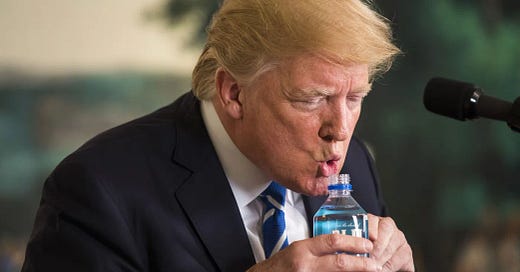Supreme Court poised to protect Trump from challenges to his suitability for presidency
Concerns abound that he is an insurrectionist who can't control his impulses.
For over two hours today, the Supreme Court was engrossed in a critical discussion that could redefine accountability in American politics. The justices, particularly those with conservative leanings, engaged in a probing dialogue with the attorneys challenging former President Trump's eligibility for office. This dialogue, while seemingly aimed at finding a pathway to support Trump, bypassed the crux of whether his actions amounted to an insurrection. This approach by the court underscores a pivotal moment in American jurisprudence, as it grapples with the principles of democracy and the rule of law.
At the heart of this legal battle is the 14th Amendment's insurrection clause, a post-Civil War provision designed to prevent those who partake in insurrections against the U.S. government from holding public office. This clause, now more than ever, symbolizes the resilience of American democracy, aiming to ensure that only those who uphold the Constitution serve in its government. The challenge against Trump, sparked by his involvement in the January 6, 2021, Capitol attack, tests the boundaries of this provision and its applicability to former presidents.
This case stands as the most consequential electoral dispute since Bush v. Gore, with the potential to halt Trump's pursuit of another presidential term. It underscores the Supreme Court's pivotal role in interpreting the Constitution in ways that safeguard democracy and hold leaders accountable for their actions.
The arguments revealed a conservative inclination to question the insurrection clause's applicability to former presidents and its enforceability without explicit congressional action. This perspective, however, overlooks the broader democratic principle at stake: ensuring that those who seek to undermine the Constitution are held accountable.
Justice Brett Kavanaugh's remarks on voter disenfranchisement shifted focus from the fundamental issue of upholding constitutional principles to the mechanics of democracy. Yet, the real disenfranchisement lies in allowing individuals who have acted against the Constitution to assume positions of power.
Chief Justice Roberts raised concerns about the potential for states to exclude candidates from ballots, hinting at a chaotic future for presidential elections. However, this view misses the essence of the 14th Amendment's role in protecting the nation's democratic integrity.
The hearing also ventured into historical precedents, notably the 19th-century case In Re. Griffin, which Kavanaugh cited as potentially instructive. Yet, this narrow focus diverts attention from the amendment's clear intent to safeguard the republic from insurrectionists.
The liberal justices, while probing both sides, seemed to seek a balance between constitutional mandates and the democratic process. Justice Ketanji Brown Jackson's observation about the amendment not explicitly mentioning "president" highlights a legal technicality but does not diminish the amendment's overarching goal of protecting democracy.
The court's deliberation extends beyond the legal arguments to the very core of American democratic principles. It challenges us to consider the kind of leaders we want and the standards to which they should be held. Upholding the 14th Amendment's insurrection clause is not just about legal technicalities; it's about affirming a commitment to a democracy that rejects insurrection and values constitutional fidelity.
As the nation awaits the Supreme Court's decision, this moment serves as a profound reflection on the values that define American democracy and the importance of defending those values against threats from within. It is a testament to the enduring power of the Constitution and the critical role of the judiciary in upholding democratic principles.





